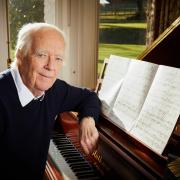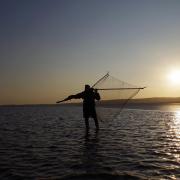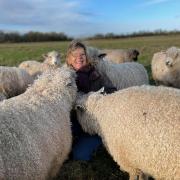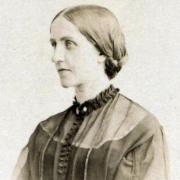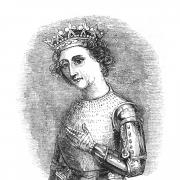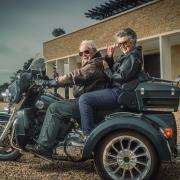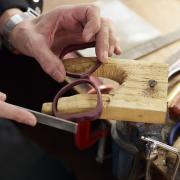Julian Fellowes talks about the hotly-anticipated new Downton Abbey – yes, it’s out! – film. Katie Jarvis (who had a sneak movie preview) chatted to him about royalty, loyalty, courtesy and costumes

I met Julian Fellowes once, back in the heady heat of last summer.
We were in a garden, where the peonies swayed like a clutch of Crawley sisters, pink, rose and white silks ruffled by a pollen-infused breeze; each topped with blossom as elegant as a cloche hat.
Behind us stood a centuries-old house, ghostly with party-goers-past, as ephemeral as the golden bubbles in their long-quaffed champagne. Overhead, a low-flying bee buzzed through a July-blue sky, lifting and dipping like a biplane. Below us, mostly unseen on this greenest of lawns, scurried worker ants, endlessly foraging.
While we…
Well, we ate effortlessly off mouth-watering platters brought to our expectant hands by attentive waiters.
Then, someone asked: "Would you like to meet Julian?"
And there he was, reclining on a garden chair under branches of a tree spreading like an emerald parasol. Surrounded by a coterie of 'names'. Dressed immaculately. Urbane and witty; generous in focus.
And that was how it was. A hierarchy of perfection. Everything in its proper place.

Julian Alexander Kitchener-Fellowes, Baron Fellowes of West Stafford, is beautifully mannered.
"Thank you very much for speaking to me," I say, gratefully, when he comes on the line.
"I'm delighted!" he replies.
"I'm more delighted," I point out. Partly because I have the more substantial claim.
And partly because manners are everything in Downton Abbey, the television series Julian Fellowes co-created back in 2010; the period drama - set in an English country house - that's taken the world by storm.
Once, when Maggie Smith (playing the distinguished Dowager Countess Violet - "Don't be defeatest, dear. It's very middle class" - Crawley) walked into a room, Dan Stevens (AKA Matthew Crawley) failed to stand up. They had to reshoot the whole scene.
In those days - back in the embryo of the 20th century - gentlemen always stood. And gentlemen always wore hats, which they unfailingly doffed to ladies in the street. (When two gentlemen met, it was not unknown for the lesser to full-doff, while his superior would merely content himself with an underplayed tweak to the brim.)
There are plenty of things Julian doesn't miss about the past: "I don't have a particularly sentimental attachment"; but he does miss politeness. Not even simply a 21st century lack of courtesy; it's rather that we seem to have exchanged it, in some Machiavellian pact, for downright rudeness.

"I mean, I don't really know anything about social media at all so I won't comment on it. But this business of being able to insult people without signing the message. That's the loose cannon at the heart of our society, isn't it?"
He steers clear of all that. Never looks at what people have written about him. "I just run in the opposite direction."
Yes: politeness he misses… And formality.
"We've made everything informal which, in the end, is slightly monotonous. Why people enjoy Oscar night is because everyone gets so dressed up; and it's all lots of tszuj (such a good word; I spend ages mistakenly looking for it under 'j') and great ball gowns. And it's fun to see - every now and then - people making a tremendous splash. I'm rather sad that so much of that has gone out of most people's lives."
Couldn't agree more!
Think luscious electric blue harem pants (daringly worn by Lady Sybil to the utter horror of her corseted relatives). Think Lady Grantham's white, tight coat with elegant black detail. Think Lady Mary's beaded ball gowns.
Anna Robbins, Downton's costume designer, once came across a delicately embroidered silk tulle, still in its original wax paper with its original Parisian labelling. It was in the Portobello Market - the tragedy was that the stallholder had already promised it to a collector. But Downton worked as Downton does, and the collector capitulated; thus, it ended its salad days as a ball gown for Violet.
"I mean," gently laments Julian, "if you think back to the 50s, people of all classes dressed far more formally in the evening if they were going out. [But now] everyone's got to be, I think, comfortable all the time. Formality, to a certain extent, involves being slightly uncomfortable. And we're not prepared to do that anymore."
So here's another vignette for you. This time, I'm in London (yes! London), in a private cinema, on the edge of my seat. At a private screening of the (at the time unreleased) hotly-anticipated Downton Abbey movie.
(Oh, the life I lead.)
Firstly, there's the music: A Grand Adventure - the soaring theme that teases whenever there's a Downton journey. And this is some journey that we're about to witness! The screen opens to the delivery of a letter. There are steam trains. (Heavens! The pageantry.) (Heavens! The budget.). Old-fashioned sorting offices. Busy hands in old-style uniforms working to get this Very Important Letter to the place we love.
And then, finally, we get to see it: the House that's become as much of a character as complex Lady Mary or loyal Mr Carson. As the postman takes the letter up the driveway (a postman on a motorbike; Downton is moving with the times), there - at last - is Downton Abbey (AKA stately Highclere). And here is the famous Downton theme (cue frantic strings; urgent piano).
We're back. We're on the big screen. And we're grander and more luscious than ever.
"It's inspired!" I say to Julian Fellowes. Not just the dramatic opening - but announcement that the letter heralds: a royal visit for Downton Abbey! A visit by King George V and his consort Queen Mary, no less.
A momentous event that - in its different ways - puts all storeys of Downton under equal pressure.
"That's the whole point! That's exactly right!" Julian chuckles, with well-merited jubilation. "A royal visit - for the servants, for the family, for the locals, for everyone - is an excitement. It's hard to think of something else that would be."
The idea occurred to him while reading a book - "A marvellous book, actually!" - called Black Diamonds, about the fabulously wealthy Fitzwilliam family of Wentworth Woodhouse (the largest private residence in the UK). A family that waxed rich on Yorkshire coal. When the real King and Queen graced them with a four-day visit in July 1912, a torchlight tattoo of miners dramatically concluded their stay, and a crowd of 25,000 congregated on the lawn to hear King George speak.
"It so turns out the King and Queen did make these tours and visits quite a lot during their reign. And they had this task, not of re-establishing monarchy because it hadn't been under threat; but it was a funny time. So many [European dynasties] had fallen at the end of the First World War. I mean, the Emperors of Russia, obviously; but also of Austria; all the kings and princes in Germany had gone.
"So they wanted to reacquaint themselves with their subjects all over the country."
Movie news was in its infancy; reels of the King were few and far between ('King George V opens his first Parliament 1910. Scenes from Buckingham Palace and the route to the Houses of Parliament'.) To give him his due, George was, in fact, the first monarch to make a radio speech. Nevertheless: "It was mainly a question of being seen physically - turning up at parades and exhibitions and all of that stuff. And they worked very hard at it."
I'm not giving much away (my signing of the NDA guarantees that, everyone) but the visit sparks dramas of every imaginable kind. Excitement; resentment; unrest; hugely comedic scenes; violence. And, of course, romance. (Let it be repeated that Julian Fellowes proposed to his wife, Emma Kitchener, a mere 20 minutes after meeting her. And 19 of those minutes were apparently spent plucking up courage.)
Does it make a difference - I ask Julian - creating dialogue for people who really existed? After all, Queen Mary - our current Queen's grandmother - lived until 1953. Which means there was an element of bravery in his writing - especially as one particularly daring scene involves the royals in a moment that's toe-curlingly hilarious.
"Queen Mary did have a funny side. As a widow, she was quite friendly with actors, which has got slightly forgotten now, but it's true. And she would go to the theatre much more as a widow because the King was less interested. So she had that whole side of her, which - when you know that - means you can hint at her having a sense of humour."
Not that Julian Fellowes would ever contemplate writing inaccuracies. On Downton, historical adviser Alastair Bruce ensures every nuance is covered: from how people hold themselves (much more upright pre- computers and mobile phones), to how much they touch (far less before the advent of antibiotics, interestingly).
"I think we have a duty to make sure [the historical detail] isn't all forgotten. I mean, some of it is quite complicated and often is wrong - even in stuff I've done, which of course makes me furious. For instance, the fact that footmen only wore gloves in a dining room to serve. You often see footmen in white gloves, carrying suitcases, and you think, as you watch it, 'They must have got dirty!' Well, the answer is, no, they didn't; because they weren't worn. And those kind of little rules - I love all that!"
***********
It's taken off beyond his wildest dreams, Downton Abbey. At its ITV peak, it was pulling in 9.5 million viewers. (Followed by a weekly average of 13.3 million in the States.) Everyone from the Clintons to Anthony Hopkins has expressed love for it. Perhaps bizarrely, it's adored in more than 100 different countries; bizarre in the sense that many (Japan, Israel) should be utterly baffled by this most English of dramas.
"I don't really understand that!" its creator admits. "I mean, I love it; and I'm terribly flattered and pleased. And I love the fact that Jim Carter was bicycling in some far-flung country up a mountain, and this bus stops and everyone jumps off and says, 'Mr Carson!' I love all that. But I don't completely understand why we hit the button quite as firmly as we did."
When the series opened, it was 1912, with the last tragic bubbles of the Titanic gently rising to the surface. When it finished, in 2015, we were experiencing the depression of the 1920s, when the man in the street struggled to find work, and hard-pressed landowners weepingly turned their large estates over to the whim of the auctioneer's gavel.
In the film, we've moved on to the giddy heights of 1927.
So how does it all work out for the Downton dynasty?
From our vantage point of the 21st century, we possess the knowledge of a sybil. The aristocracy, our prescience tells us, is on a fast train downhill. In 2019, we can still just about see their shadows. "But the aristocracy are no longer calling the shots now," Julian muses, "and I'm not sure that any significant particular group is. There seems to be some sort of cosmic movement that every now and then this lot of people seems to be in charge and then it's that lot of people."
He has no influence over cosmic movements. But he does pull the strings at Downton. Is there a TV future, then, for the Crawleys 'above', and the busy servant-crew below?
Julian Fellowes laughs, somewhat - it has to be acknowledged - tantalisingly.
"We shall see. In my business, you must never say never because you find yourself eating your words. I mean I'm sure it will very much depend on how well the film goes down. And that remains to be seen."
Read Katie's interview with Downton Abbey producer Gareth Neame here.
Read Katie's interview with Gloucester soprano Mary-Jess, and the voice of the Downton Abbey theme, here.




